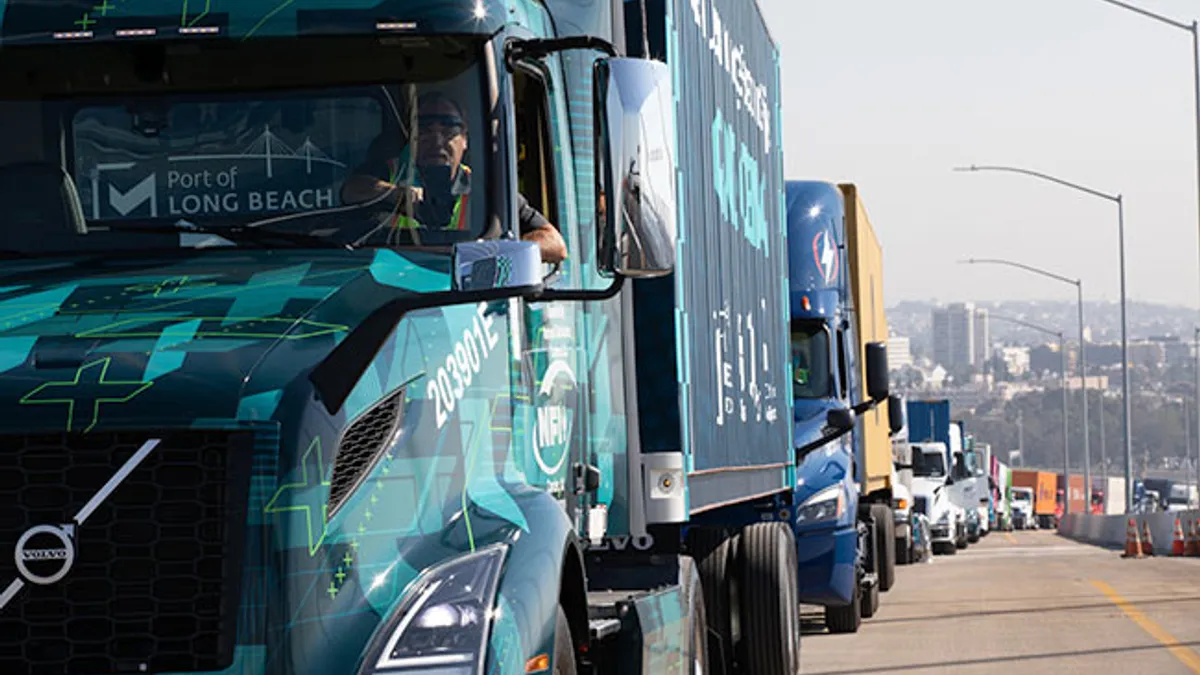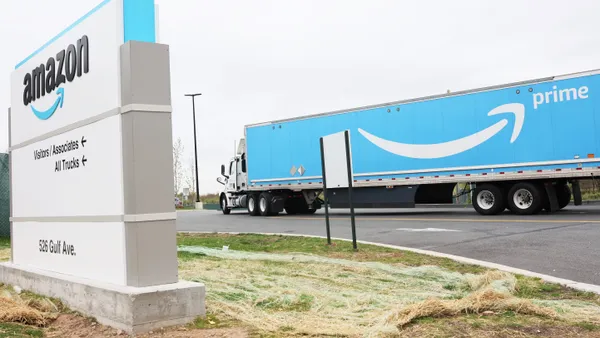Dive Brief:
- The Long Beach Board of Harbor Commissioners approved an exemption from the Clean Truck Fund Rate "for the cleanest" natural-gas-powered trucks, according to an announcement Monday. The rate, which has been set at $10 per TEU for any non-zero-emissions truck at the Port of Long Beach and the Port of Los Angeles, has not yet been implemented.
- This new exemption applies to trucks picking up or dropping off loaded containers at the Port of Long Beach that use natural gas engines that meet the standard of 0.02 grams of nitrogen oxides per brake horsepower-hour, according to the announcement. To be eligible for the lifetime exemption, trucks must be purchased and registered in the Port Drayage Truck Registry by Dec. 31, 2022.
- Electric trucks already have an exemption to this pending rate. The natural-gas exemption aims to incentivize the trucking industry to adopt cleaner fuels "while zero-emissions technology catches up," the announcement said.
Dive Insight:
In its trailblazing efforts to cut carbon, California is holding the entire supply chain responsible for emissions, especially in the southern part of the state. Heavy-duty trucks are often targeted as a large source of pollution, which has resulted in regulations such as the California Air Resources Board's Advanced Clean Trucks Act, which will ban all sales of new, non-zero-emissions vehicles come 2045.
The Clean Truck Fund Rate was approved by the two San Pedro Bay ports last year, but it's not expected to take effect before early 2022, Port of Long Beach Executive Director Mario Cordero said in an email. The rate is expected to generate $80 million in its first year, according to the port.
But the warehouses that trucks travel to and from are also implicated by truck emissions as far as the state government is concerned.
On May 7, the South Coast Air Quality Management District voted to adopt the Warehouse Indirect Source Rule, which requires warehouses greater than 100,000 square feet to directly reduce nitrogen oxide and diesel particulate matter emissions, "or to otherwise facilitate emission and exposure reductions of these pollutants in nearby communities."
That aligns with another South Coast AQMD effort, the Warehouse Actions and Investments to Reduce Emissions, in which large warehouses would need to accrue a certain number of points, based on efforts to reduce emissions from truck trips to and from that facility.
The San Pedro Bay ports have their own Clean Air Action Plan, which aims to transition the entire fleet of trucks at the two ports to zero emissions by 2035. That goal is aligned with proposed state regulatory efforts that are expected to mandate zero-emission drayage trucks by 2035, Port of Long Beach Executive Director Mario Cordero said in an email.
In California, the necessary equipment is perhaps more available to fleets than it is in other states. Much of the activity around electric-truck development has taken place there, thanks in large part to funding from the state government.
NFI is working with Daimler in Chino, California. And Los Angeles-based Dependable Supply Chain Services is participating in Volvo's Low Impact Green Heavy Transport Solutions project, known as Volvo LIGHTS. That program is supported by a sizable investment from CARB.
Though numerous projects are in prototype and pilot phases, no fully electric trucks are being produced at commercial levels. Alternative fuels offer a way to be greener, in the meantime.
"These trucks will emit 90% less nitrogen oxides than equivalent vehicles today," Cordero said in the announcement. "The question we were asking ourselves was do we reduce emissions now or do we wait for tomorrow?"
Providers of alternative fuels have been focused on setting up shop in the Golden State. SoCalGas has dozens of compressed natural gas stations for heavy-duty trucks in the area it's named after. Last October, the company started providing California-produced renewable natural gas at a number of its stations for the first time.
Renewable diesel is also becoming more available in the state. Neste, whose renewable diesel is approved by CARB, has 13 fueling locations in California. U.S. Gain is working with AJR Trucking to build a renewable natural gas station roughly 16 miles from the Port of Long Beach. Even the renewable diesel that the Love's Family of Companies and Cargill plan to produce in Nebraska will be, for the most part, headed to California.
This story was first published in our sister publication, Transport Dive. Sign up here.














